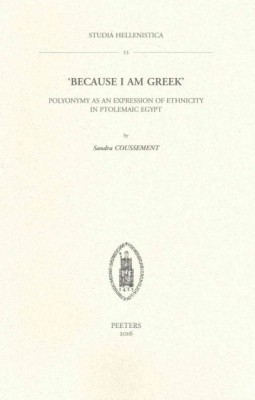| 'Because I Am Greek': Polyonymy as an Expression of Ethnicity in Ptolemaic Egypt Contributor(s): Coussement, S. (Author) |
|
 |
ISBN: 9042932724 ISBN-13: 9789042932722 Publisher: Peeters OUR PRICE: $117.80 Product Type: Paperback Published: February 2016 |
| Additional Information |
| BISAC Categories: - History | Ancient - Egypt - Language Arts & Disciplines | Linguistics - General |
| Series: Studia Hellenistica |
| Physical Information: 0.8" H x 6.1" W x 9.4" (1.46 lbs) 449 pages |
| Themes: - Chronological Period - Ancient (To 499 A.D.) - Cultural Region - North Africa - Cultural Region - Middle East |
| Descriptions, Reviews, Etc. |
| Publisher Description: Double names have a long history in Egypt. They are already attested on Old Kingdom funerary monuments, where concern about eternal life required a correct identification of the deceased. When Greek and Egyptian cultures came into contact under the Ptolemies, bilingual polyonymy (i.e. the combination of an Egyptian and a Greek name) became more popular. During this period, Greek ethnicity was valued as a symbol of power and social status, and was used to create borders between the rulers and the ruled. At the same time, however, it was a flexible concept and this made it a useful tool for crossing the very same boundaries it constructed. As ethnicity became a crucial aspect of one's identity, it is not surprising that bilingual polyonymy was well attested among those that formed a bridge between the ruling class and the Egyptian population: particularly military, administrative and priestly officials. Since they moved between largely separated ethnic contexts, combining names of different linguistic origins was a way to negotiate their ethnic identities. Rather than serving as a reliable source for ethnic origin, names can therefore be interpreted as an expression of the ethnic identity of an individual in a certain space or context. |